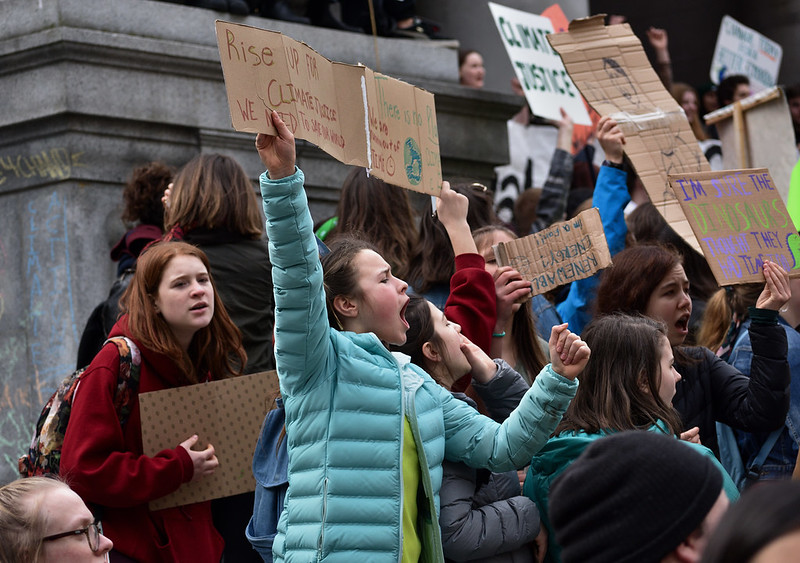A climate scientist speaks to youth strikers

This is a transcript of the speech that Professor John Marsham gave to the Leeds Youth Climate Strike in September 2021.
I’m here for two reasons today. Firstly, I’m a climate scientist at the University of Leeds and I’ve been asked to say a few words about the new report from the UN’s Intergovernmental Panel on Climate change, the IPCC.
Secondly, I’m here as an individual. My own children are too young to understand the climate crisis and too young to take the actions that you are choosing to take. So I just want to thank all of you for doing that.
The IPCC doesn’t do new research. But what the report does provide is a synthesis of the science on which 195 countries have agreed. And, like past reports, what it shows is the urgent need for action to reduce emissions.
We have currently warmed the word by just over 1 degree. Based on 2020 emissions, the world will exhaust the carbon budget for the 1.5 degree target of the Paris agreement in just 11 years. That’s before my children can even vote.
The latest report shows far more certainty in attributing recent deadly extremes to climate change. Climate change has hugely increased the probabilities of events like the German floods, Greek fires, and North American heatwave. Sometimes making otherwise essentially impossible events possible. It is also critical for events in poorer and more vulnerable regions of the world that in the UK you tend to hear less about, e.g. for the Madagascan drought & famine, and Pakistan heatwave. Looking forward, even with just 1.5 degrees of warming we expect a heatwave that should occur once every 50 years to occur around every six years.
Another difference from past reports is greater clarity on irreversible impacts and tipping points. At 2 degrees we expect to lose essentially all the world’s tropical coral reefs and everything that depends on them. And all over the world warming is expected to lead to loss of species as we change the climate.
The Greenland ice-cap could be pushed into irreversible decline at any time from now to a 4 degree warming, but the less we emit the slower that melting will be, and the more likely we avoid irreversible loss.
Even in the lowest emissions scenarios used by IPCC we expect sea levels to rise by 1-3 metres by 2300. With high emissions that could be 15 metres. To give some context, right now around 250 million people live within 2 metres of sea level.
In summary, without urgent action, populations across the world will continue to experience growing combinations and sequences of fires, droughts, floods and famines. The Covid-19 pandemic has shown how the whole world is connected, and the latest World Bank report estimates without early action, over 200 million people could be displaced from their homes by climate change by 2050,
But what the IPCC report also shows is that with rapid emission cuts in the next 10 years the 1.5 degree Paris target is just reachable. We also know from the Covid-19 pandemic that rapid change is possible. We have renewable electricity. We can insulate homes. We can choose not to expand roads and airports, and instead invest in cycling and public transport. In many cases these changes save money, create jobs and have other benefits. We just need action at all scales: international, national, regional, local and individual.
Finally, on a personal note, I would add that if you look at the history of big societal changes – for example votes for women, or the abolition of slavery – it is clear that very often the people lead the change and the politicians follow. So, thank you again for taking the time to lead the change we need.
John Marsham is Professor of Atmospheric Science and Met Office Joint Chair at the University of Leeds.
You can also take a look at some answers to climate strikers questions.
Image: "Youth Climate Strike 2019-03-15, Vancouver" by roaming-the-planet is marked with CC BY-NC-ND 2.0
